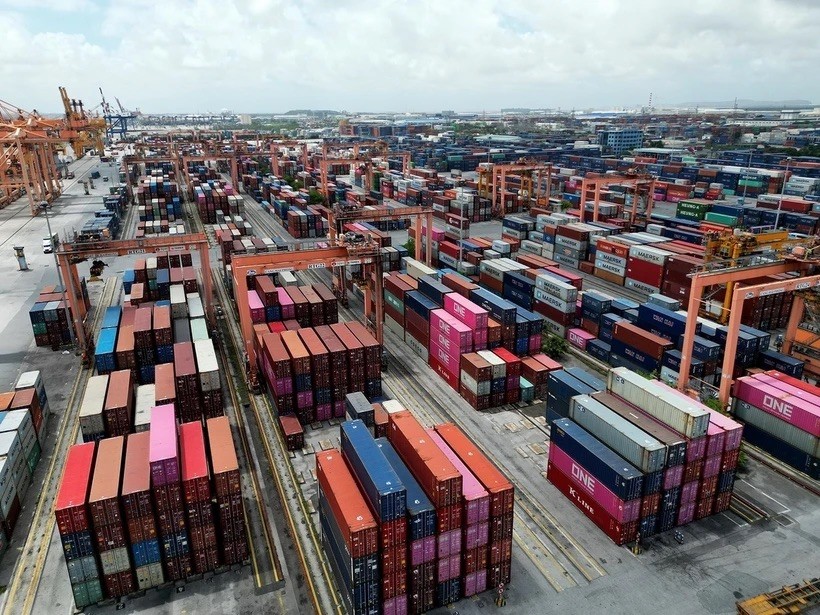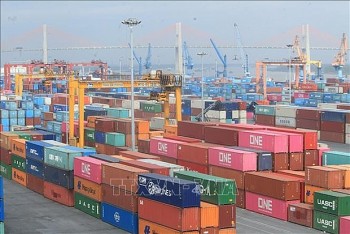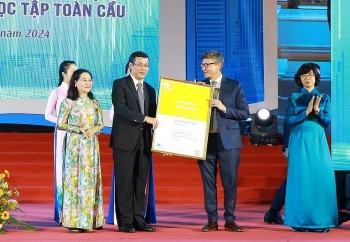Vietnam's Economic Development Receives International Recognition
| Vietnam National University - Hanoi Awarded QS Recognition of Improvement | |
| Vietnam Becomes Vice President of Asia-Pacific UNESCO Clubs and Associations |
GDP growth remains positive in the coming time
Accordingly, foreign experts analyzed a number of difficulties and challenges of the Vietnamese economy, emphasizing that global trade growth has slowed down due to high energy prices and prolonged inflation. These aspects negatively affect Vietnam which relies on exports and production.
However, in general, Vietnam's economic prospects remain positive, with growth forecast to reach 4.5% - 6% in 2024 and 4.7% - 7% in 2025. Oxford Economics forecasts GDP growth of 5.6% in 2024, while United Overseas Bank - UOB (Singapore) forecasts Vietnam's economic growth rate to reach 6% in 2024 and 6.4% in 2025.
Also, Maybank Research forecasts Vietnam's GDP growth to recover in 2024 and 2025, at 4.5% and 4.7%, respectively, from 4% in 2023, while ING THINK forecasts Vietnam's GDP growth in 2024 at 6%, one of the highest growth rates in the region, and is expected to increase to 6.5% in 2025.
S&P Global Ratings also forecasts that Vietnam's economic outlook remains positive, with real GDP growth at 5.8% in 2024 and returning to the long-term trend of 6.5-7% in the next 3 to 4 years.
Both exports and imports are likely to return to steady growth in 2024. The current account surplus will remain high, at around 5.5% of GDP in 2024, before declining in line with the long-term trend from 2025.
The macro-economy is assessed to be stable and increasingly diversified thanks to a booming manufacturing sector, largely driven by FDI. Vietnam remains an attractive destination for foreign investment, particularly in manufacturing, as businesses continue to diversify their operations across the region.
 |
| (Photo: TTXVN). |
The foreign press also highlights that one of the reasons Vietnam becomes an attractive FDI destination in Southeast Asia is its young, increasingly educated and competitive workforce. It will help sustain long-term growth of the country.
The logistics network serving exports is increasingly complete, making the manufacturing industry attractive to global corporations in the electronics, mobile phone and textile industries.
FDI-invested industries continue to boost domestic activity, with better job opportunities and higher wages, thereby boosting personal consumption growth. The semiconductor industry growth cycle is also expected to boost Vietnam's growth in 2024 as semiconductor exports increase.
On the other hand, in the services sector, cross-border tourism is recovering, with a surge in Chinese tourists. Domestic demand is also recovering, although it is still lagging behind GDP growth. Public investment is likely to accelerate gradually in the coming years, mainly from the state budget.
Vietnam is a rising star, a bright spot in Southeast Asia with international integration
The website of the Goyang city government, Gyeonggi province (South Korea) assessed that Vietnam is a rising star in Southeast Asia.
Known as an emerging economy in Asia, Vietnam has developed into the world's 35th largest country in terms of gross domestic product (GDP) and the world's 26th largest in terms of purchasing power parity (PPP) by 2023 (IMF statistics).
Vietnam has now become a medium-sized economy and a lower middle-income country. GDP per capita is about US $4,300, equivalent to about US $14,000 in PPP terms. This is a major step up from the US $1,200 when Vietnam began its reforms.
As economic reforms progressed, Vietnam's economic system also changed. Its industrial structure became a typical model for developing countries. The direct investment from foreign sources has continued to increase as Vietnam has implemented reform policies, especially since 2006, before Vietnam joined the WTO. As Vietnam's economy develops, not only FDI companies but also domestic companies are becoming more and more competitive.
Vietnam has gained a trade surplus since 2012 (except 2015), owing to exports from foreign-invested companies. FDI companies also play an important role in other manufacturing sectors.
The country is also trying not to fall behind in the high-tech industry, and the global supply chain of high-tech industrial products such as mineral raw materials such as rare earths, electric vehicle batteries, semiconductors. In addition, Vietnam is also making efforts to foster IT human resources by attracting IT centers of world-class companies to Vietnam.
In an interview done by CNBC (USA) with Kai Wei Ang (ASEAN economist at BofA Securities Inc.) on CNBC (USA), the expert said that Vietnam is considered a bright star in Southeast Asia despite the power shortage that occurred last year and the weakening real estate market.
Vietnam and ASEAN are clearly the biggest beneficiaries of the “China + 1” strategy, he said. Southeast Asia is the natural choice because of its proximity to China. Vietnam’s advantages in terms of a competitive labor market and a series of FTAs make exporting to other markets such as the European Union much easier. These advantages provide the fundamental support for Vietnam to attract investment.
Driven by dynamic collaboration between global investors and local tech innovators, Vietnam is also seen as becoming a digital hub, It currently ranks second in digital economic development in the world.
The World Bank believes that Vietnam's digital economy is expected to exceed US $43 billion by 2025 thanks to the continuous focus on promoting information and communication technology, including initiatives to integrate AI tools.
An increasingly high-quality workforce is one of many factors helping Vietnam emerge as an attractive destination for business innovation. The government has introduced a series of initiatives and policies to boost IT education and training. Vietnam has 57,000 IT graduates each year, among the highest in the world.
Semiconductor manufacturing is another area that is growing strongly. Experts stated that investments from the US and deeper ties with major corporations such as Microsoft, Nvidia and Marvell have put Vietnam in a position to play a major role in the industry in the coming years.
 | Vietnam's Market Economy Is Close to Win the US Recognition In early May 2024, the US Department of Commerce held a hearing on the recognition of Vietnam's market economy. According to experts, the earlier US ... |
 | UNESCO Recognizes HCMC as a "Learning City" On the evening of March 30, the People's Committee of Ho Chi Minh City organized the ceremony to celebrate on the occasion that the city ... |







